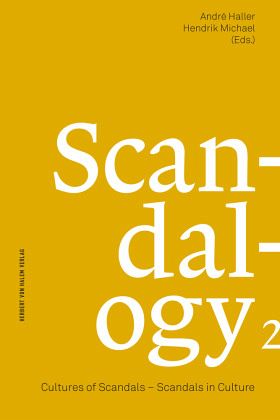
Scandalogy, Bd.2
Cultures of Scandals - Scandals in Culture
Herausgegeben: Haller, André; Michael, Hendrik

PAYBACK Punkte
0 °P sammeln!
Mitte März 2018 skandalisierten Medien die Datenberatungsfirma Cambridge Analytica und den Milliardenkonzern Facebook wegen fragwürdiger Methoden, die während der Brexit-Kampagne und des US-Wahlkampfs 2016 Anwendung fanden. Die Affäre um die beiden Unternehmen machte deutlich, dass viele Skandalfälle nicht an Ländergrenzen Halt machen und je nach kulturellem Hintergrund unterschiedlich beurteilt werden."Scandalogy 2: Cultures of Scandals - Scandals in Culture" vereint aktuellste Forschungsergebnisse internationaler Forscher zum Themenfeld "Skandale". Ein besonderer Fokus liegt dabei auf ...
Mitte März 2018 skandalisierten Medien die Datenberatungsfirma Cambridge Analytica und den Milliardenkonzern Facebook wegen fragwürdiger Methoden, die während der Brexit-Kampagne und des US-Wahlkampfs 2016 Anwendung fanden. Die Affäre um die beiden Unternehmen machte deutlich, dass viele Skandalfälle nicht an Ländergrenzen Halt machen und je nach kulturellem Hintergrund unterschiedlich beurteilt werden."Scandalogy 2: Cultures of Scandals - Scandals in Culture" vereint aktuellste Forschungsergebnisse internationaler Forscher zum Themenfeld "Skandale". Ein besonderer Fokus liegt dabei auf der Skandalberichterstattung, etwa durch eine Langzeitstudie in Großbritannien oder durch eine Analyse der Berichterstattung über Spionage im Kalten Krieg in den USA. Andere Beiträge widmen sich Online-Skandalisierungformen wie dem sogenannten "Shit Storm".Der Sammelband richtet sich an Forscher und Studenten, insbesondere in den Kommunikations- und Medienwissenschaften, der Politikwissenschaft und Soziologie. Die Befunde sind außerdem für Berufspraktiker, vor allem für PR-Berater, Pressesprecher und Krisenkommunikationsexperten, von hohem Interesse.
Dieser Artikel kann nur an eine deutsche Lieferadresse ausgeliefert werden.













